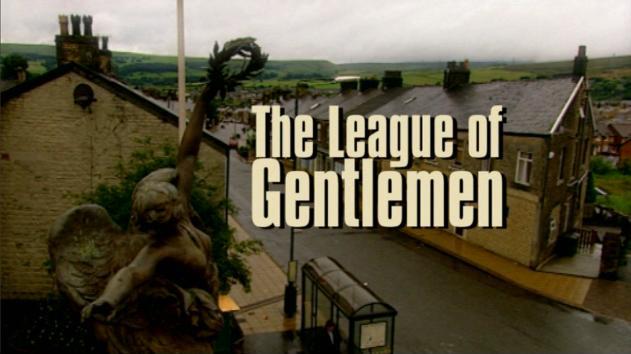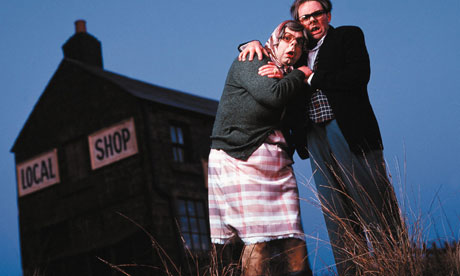Written by Max Thornton.
Do you remember Work It? If you’ve spent the last year and a bit trying to scrub all memory of it from your brain, I don’t blame you and I’m sorry for reminding you of those ten excruciating days in January 2012 when ABC was airing a sitcom “about” (to quote its Wikipedia entry) “two men who must dress as women in order to keep a job in a bad economy.”
ABC president Paul Lee justified this terrible, horrible, no-good, very bad show by saying: “I’m a Brit, it is in my contract that I have to do one cross-dressing show a year; I was brought up on Monty Python. What can I do?” His epic wrongosity on many levels notwithstanding, the man is right about one thing, and that is Britain’s bizarre, confusing obsession with drag. I am never quite sure if the cross-dressing that permeates British culture, from Python to Christmas panto, is a Rocky Horror-style celebration of diversity and queerness, or the basest form of “LOLOLOL A MAN IN A DRESS!!” transphobic humor. TV show The League of Gentlemen exactly straddles this line.
 |
| This is a local shop for local people. There’s nothing for you here. |
The League of Gentlemen aired three short seasons and a Christmas special on the BBC between 1999 and 2002. I first encountered the show in late-night reruns and the 2005 feature film, which between them fueled an obsession strong enough for me to keep the theme music as my ringtone for a couple of years. It’s been a while, though, since I gave this show any thought (other than appreciating the creators’ nightmare-inducing follow-up project, Psychoville) – until last week, when I stumbled upon the happy knowledge that BBC Worldwide has made all of season one available on YouTube. LoG, though an influential powerhouse of modern comedy back in Blighty,is unfairly little-known outside of its country of origin, and I’ve had no luck hunting down seasons two or three (curse you, DVD box set that I for some reason left at my parents’ house!). However, the three hours that constitute season one provide quite enough fodder for reflection on their own.
The show centers on the strange, sinister, often very sad inhabitants of fictional Middle England town Royston Vasey. The unifying master plot of season one is the “New Road,” a highway being built to connect Royston Vasey with the wider world, and the range of responses from the locals; but really the focus is on the locals themselves, with their bizarre quirks and quiet desperation.
Nearly every character in Royston Vasey is played by the three performing members of the League (a fourth, Jeremy Dyson, stays off-camera): Steve Pemberton, Mark Gatiss, and Reece Shearsmith. Each adopts an impressive variety of personae, from creepy butcher to embittered vicar to obnoxious teen horror buffs to the iconic shopkeepers Tubbs and Edward. Almost all of the characters are grotesque (except for one or two of those played by Shearsmith, aka the good-looking one) – it’s not something that’s confined to the female characters for nasty transmisogynistic laughs, and frankly Shearsmith makes almost as attractive a woman as he does a man.
 |
| Reece Shearsmith: yep and also yep. |
In a fascinating decision for a show whose entire female cast is played by men, one of the characters is a trans woman. Going into my rewatch, I was concerned about the handling of Royston Vasey’s local taxi driver Barbara (voiced by Pemberton): in 2013, the mainstream British media is still rifewith transmisogyny, and how much worse would it have been in a sitcom in 1999?
And at first it does seem like the only joke is going to be “HAHA A TRANS WOMAN, ISN’T THAT HILARIOUS??!!!” In Barbara’s first appearance, we see her cab’s exterior and hear a gruff voice speak. In the course of chatting with her passenger, she casually reveals that she buys dresses (laugh track!) and that she takes hormones and they have intimate effects (laugh track!). These early jokes are pretty grossly offensive: the camera pans over Barbara’s high heels, jewelry, and extremely hairy chest (for fuck’s sake), and we don’t even catch a glimpse of her face until the final episode of the season. Meanwhile Barbara cheerfully overshares details of her forthcoming bottom surgery to whoever happens to be in the cab. The cumulative effect is dehumanizing, othering, and pathologizing, reinforcing both the laziest transmisogynistic humor – she has a deep voice and a hairy chest (because trans women always just hang onto unwanted secondary sex characteristics), but she also wears dresses and heels! Hahahahahaha! – and the transphobic notion that trans people are somehow obscene, through being particularly inappropriate and overly obsessed with surgery and genitalia.
 |
| Lots of shots like this, but heaven forfend we see her face. We might think she was an actual human being. |
But. If half the characters on your show are actually men in dresses, and if you’re making them funny by actually writing jokes for them, the hypocrisy and comedic paucity of relying on ugly “man in a dress” mockery of your trans character quickly become apparent. Although the transmisogyny never fully leaves (I suppose each week you want to catch new viewers up on the HIGH-larious conceit of a trans woman existing), the jokes definitely take on a kinder spirit as the season goes on. Witness this exchange, when Barbara tells snooty Mrs. Levinson about the “beast of Royston Vasey”:
Barbara: “They dug something up working on the new road.”Mrs. Levinson: “Oh, Barbara, stop it. You’re giving me the willies!”Barbara: “Well, you’re very welcome to mine – it’s coming off in a fortnight anyway.”
That’s a genuinely funny, non-hateful trans joke. What a shame the League didn’t write more like that.
On the upside, as much as Barbara’s propensity to graphic oversharing is played for transphobic laughs at her expense, the residents of Royston Vasey never seem that fazed by it. They are shown to be thoroughly accepting of Barbara, much more so than you might expect from a Middle England village on TV in 1999. When petty-minded Geoff, having been the butt of a homophobic joke he didn’t quite get, asks Barbara for clarification, he sighs, “I don’t know why I’m asking you – you’re a woman.” (Of course, that little moment of acceptance is promptly ruined by Barbara’s reply, “Not quite, Geoff. They’ve got to open me up first, along the base of the scrotum…”)
And the inevitable scene of awkward sexual encounter between Barbara and out-of-towner Ben is written with surprisingly little transphobia. I mean, it still relies on some pretty disgusting tropes of trans women’s supposed excessive sexual aggression and obsession with genital configuration, but Ben’s dialogue in the scene is remarkably free of trans panic. In fact, every line he speaks could be recontextualized without change to a scene with a cis woman to whom he wasn’t attracted.
These are minuscule successes, but then I have very, very low expectations for mainstream media depictions of trans women – especially in a comedy, especially in the last century (the last 14 years constitute a long time in the advance of trans rights). The thing is, The League of Gentlemen is at its core not a hateful show (unlike certain of its imitators). There’s a sketch portraying the relationship between a pampered rich woman and her maid, which skewers British class relations at the expense of the privileged. There’s a character whose specialty is finding people with disabilities and talking well-meaning but appallingly ignorant drivel at them until he’s dug himself deep into a chasm of offensiveness. There’s an acting troupe whose educational play on acceptance of gay people is a masterclass in cluelessly paternalistic fauxgressive claptrap. In general, LoG excels at zeroing in on Middle England’s most small-minded, unexamined fear and hatred of difference, particularly when it’s coated with a misguided and sanctimonious belief in one’s own tolerance. The case of Barbara is striking because it’s a rare failure to ridicule the right target.
 |
| But I sill love the show, and you should still watch it. |
Max Thornton blogs at Gay Christian Geek, tumbles as trans substantial, and is slowly learning to twitter at @RainicornMax.


Gatiss also played the occasional good-looking woman, although, being 6’2, broad shouldered, and with a weird nose does make him a less obvious candidate for it than Shearsmith, it’s true. (She says, for no other reason than that she’s a Gatiss fangirl).
I always found Barbara to be kind of an anomaly in LoG? Because most of the other characters, when they have a schtick, and most of them do, there’s more depth to it; the Dentons are obsessed with toads and neatness, and the show expands on why exactly that’s hilarious and terrifying; Hilary Bris has his Special Stuff, and that fuels a plot. Whereas Barbara is just… a ‘manly’ trans*woman who overshares, and that’s it. She’s always felt a bit lazy in comparison to much of the other, very intelligent, writing to me. Though I do find it interesting that in a town populated almost exclusively by creeps and psychos, Barbara’s only sin is that overshare. One of those very miniscule successes, I suppose.